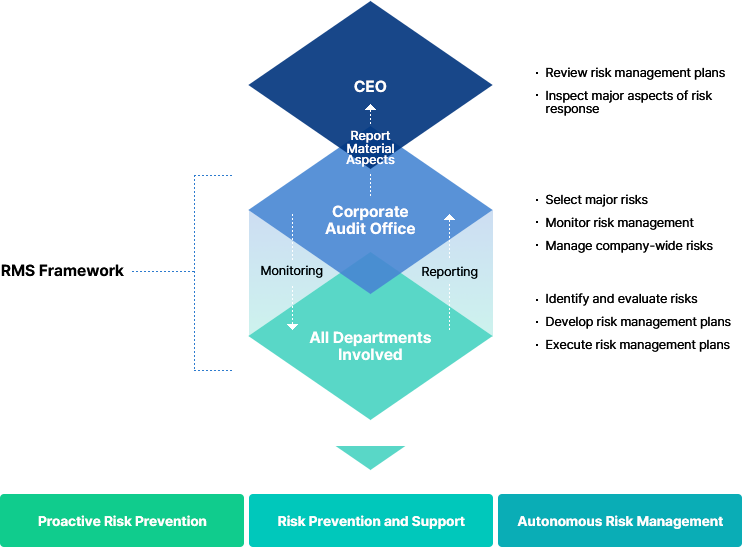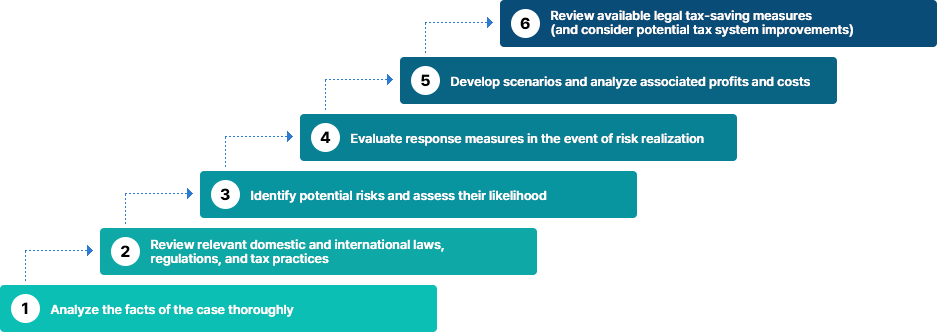Board of Directors
Organization
POSCO strives to uphold advanced governance practices by voluntarily appointing multiple outside directors to its Board of Directors (BOD), in accordance with Article 26 of its Articles of Incorporation. Two of these outside directors serve as chairs of the BOD’s key committees—the ESG Committee and the Audit Committee.
Composition
As of March 2025, the Board of Directors is composed of three inside directors, two outside directors, and one non-executive director. Directors are elected at the General Meeting of Shareholders in accordance with applicable laws, regulations, and POSCO’s Articles of Incorporation. Individuals with proven expertise and experience are appointed to ensure transparency and independence in the Board’s decision-making process.
| Category | Name | Area of Expertise | Key Experience |
Term |
|---|---|---|---|---|
| Inside Director |
Lee, Hee-Geun |
Overall Management
(Technology, Production, Safety, Environment)
|
Current) CEO of POSCO Former) Head of Safety & Environment Division, POSCO |
Mar. 2025 – |
| Kim, Young-Joong | Marketing, International Trade |
Current) Head of Marketing Division, POSCO Former) Head of Steel Products Team, POSCO HOLDINGS |
Mar. 2023 – Mar. 2026
(Reappointed
Mar. 2025) |
|
| Shin, Sung-Won | Finance, Strategy | Current) Head of Corporate Planning & Finance Division, POSCO Former) CEO and President, POSCO INVESTMENT |
Mar. 2025 – |
|
|
Outside |
Park, Jae-Hwan |
Finance, Accounting |
Current) Professor, School of Business Administration, Former) Non-standing Member, |
Mar. 2022 – Mar. 2028
(Reappointed
Mar. 2025) |
|
Lee, Min-Ho |
Environment |
Current) Head of ESG Research Center, Yulchon LLC Member, |
Mar. 2022 – Mar. 2028
(Reappointed
Mar. 2025) |
|
|
Non-Executive Director |
Chun, Sung-Lae |
Steel Strategy, |
Current) Head of Business Synergy Division, POSCO HOLDINGS |
Sept. 2024 – Mar. 2026
(Reappointed
Mar. 2025) |
Specialized Committees
Managing ESG Risks Through the ESG Committee
Specialized Committees(2025)
| Category | ESG Committee | Audit Committee |
|---|---|---|
| Composition | Lee Min-Ho, Chair Park Jae-Hwan, Outside Director Shin Sung-Won, Inside Director |
Park Jae-Hwan, Chair Lee Min-Ho, Outside Director Kim Young-Joong, Inside Director |
| Key Roles | • Review environmental, and low carbon policies • Pre-review health and safety plans • Monitor ESG-related implementation progress |
• Audit the execution of directors’ duties • Appoint an external auditor • Review internal accounting |
Operational Status
Corporate Governance Charter
POSCO established the Corporate Governance Charter based on the firm belief that sound governance is essential to earning stakeholder trust, ensuring responsible management, and becoming a leading global company.
In accordance with the Charter, we aim to uphold transparent, ethical, and accountable management under the supervision of an independent Board of Directors. Committed to promoting a fair and balanced approach to the rights and interests of all stakeholders, including shareholders, customers, and employees.
Independence, Expertise, and Transparency
POSCO appoints experts with extensive experience across diverse fields—including industry, finance, academia, law, and the public sector—as outside directors to support rational and unbiased decision-making of the management. Their capabilities are further enhanced through regular briefings on key corporate strategies and issues, including company-wide initiatives, steelmaking operations, and matters related to carbon, safety, and the environment.
In 2024, eight Board of Directors meetings were held, with 100% attendance by all outside directors. The ESG Committee met seven times, and the Audit Committee convened eight times.
Remuneration Policy
Risk Management
Risk Management
Risk Management System
1)RMS refers to a system that identifies, evaluates, and manages risks across key business functions such as finance, procurement, marketing, investment, production, and facility operations.


